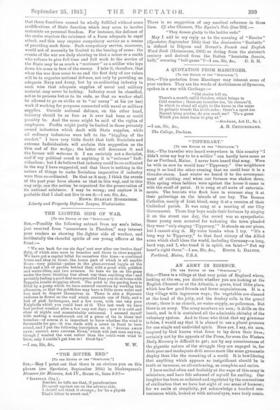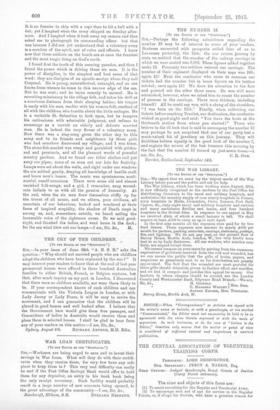AN ARMY IN ESSENCE.
[To THE EDITOR OP THE " spurrAroz.".1 Sin,—There is a village at that very point of England where, looking at the sea, you doubt whether you are looking at the English Channel or at the Atlantic, a grave, kind little place, which has few good friends and fewer acquaintances. It is a tiny village with ingenuous ways ; the vegetables are cleaned at the head of the jetty, and the donkey rolls in the gravel street; there is no church, no water-supply, no policeman. But there is an army. The army numbers six men; it drills on the beach, and in it is contained all the admirable chivalry of the voluntary system. And to those who think that my grammar is false, I would say that it is absurd to use a plural pronoun for one single and undivided spirit. Here are, I say, six men, inspired by God knows what force to lay down their lives; certainly not by the appeals of the Press, for even the Western Daily Mercury is difficult to get; nor by any consciousness of the gigantic nature of the struggle they are engaged in, for their poor and inadequate drill seems more like some gymnastic display than like the remaking of a world. It is bewildering that anything which appears so insignificant should be in truth so immense, so all-embracing, so complete and entire.
I have smiled often and foolishly at the ways of this army in miniature, and have felt ashamed of myself for smiling. Our laughter has been so ordained and regulated by the conventions of civilization that we have lost sight of our sense of humoar; for we smile at simplicity, yet acknowledge a hundred con- veniences which, looked at with naturaleyes, were truly comic.
It is no funnier to skip with a rope than to bit a ball with a bat; yet I laughed when the army skipped on Sunday after- noon. And I laughed when it took away my camera and then asked me to photograph its commanding officer but that was because I did not yet understand that a voluntary army is a creation of the spirit, not of rules and officials. I know now that these soldiers on the beach are at once the funniest and the most tragic thing on God's earth.
I found first the truth of this seeming paradox, and then I found the power which is driving these six men. It is the power of discipline, in the simplest and best sense of that word : they are disciples of an apostle-martyr whom they call Corporal. He is young, unintellectual, untaught, and no one knows from whence he came to this narrow edge of the sea. But he was sent ; and he turns comedy to earnest. He is recruiting missionary to the village folk, and takes his drill at a courteous distance from their sleeping babies ; his tongue is ready with his men, readier with his women-folk, readiest of all with the children who tumble about the little cottages. He is a veritable St. Sebastian to look upon, but he tempers his enthusiasm with admirable judgment, and refuses to encourage as a recruit an elderly and delicate married man. He is indeed the very flower of a voluntary army. Now there was a sing-song given the other day to this army and to its friends and neighbours by three girls who had somehow discovered my village; and I was there. The stone fish-market was swept and garnished with golden- rod and persicaria, and all the pleasant weeds of peaceful country gardens. And we found our tidier clothes and put away our pipes ; some of us even cut our hair for festivity. Lamps were set about the walls, and right under our windows the sea sobbed gently, denying all knowledge of hostile craft and brave men's bones. The music was spontaneous, senti- mental, nnself-conscious. There were some old and almost vanished folk-songs; and a girl, I remember, sang second- rate ballads to us with all the passion of hninanity. At the end, when the six men drew themselves stiffly up for the truest of all music, and we others, poor civilians, all uncertain of our behaviour, looked and wondered at their faces of inspired stupidity, the shadow of Death crept in among us, and, somewhere outside, we heard calling the inexorable voice of the righteous cause. So we said good- night, and thanked the ladies, and went home in the dark ;
for the sea wind blew out our lamps.—I am, Sir, dtc., M.



































 Previous page
Previous page